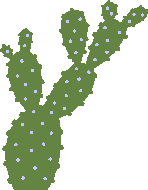 Managing Scale Insects - April 9, 2003 Jeff Schalau, County Director, Agent, Agriculture & Natural Resources Arizona Cooperative Extension, Yavapai County Scale insects can be serious pests on all types of woody plants and shrubs. They are so unusual looking that many people do not at first recognize them as insects. This is because they are hidden under a disk-like or waxy covering, and lack a separate head or other recognizable body parts. They often colonize plants without being easily detected and, by the time they are noticed, the host plant has been weakened and may be dying back. Armored scales and soft scales are the most common groups of scales on woody plants. All scales have long piercing mouthparts with which they suck juices out of plants. They may occur on twigs, leaves, branches, or fruit. Severe infestations can cause overall decline and even death of plants. Some scales have many natural enemies that often effectively control them. Introduced (exotic) scales may not have natural enemies and are therefore more difficult to control. Armored scales (family Diaspididae) are less than 1/8 inch in diameter and have a plate-like cover. They are called armored scales because the scale cover is quite dense and provides a degree of protection from pesticides and parasites. The armored scales hatch from eggs, settle down, lose their legs, and form a hard cover that is usually separate from the scale's body. Armored scales do not excrete honeydew that can attract and nourish ants. Oystershell scales are an example of an armored scale that impacts willows, aspens, cottonwood, and box elder in our area. Female soft scales (family Coccidae) may be smooth or cottony and have a diameter of 1/4 inch or less. They are usually larger and more rounded and convex than armored scales. The surface is the actual body wall of the insect and cannot be removed. Most immature soft scales retain their barely visible legs and antennae after settling and are able to move, although slowly. Soft scales often produce large quantities of honeydew, which is excreted by these insects as a waste product and attracts ants. Most armored scales have several generations a year, while most soft scales often have only a single generation. Eggs of both types of scales are often hidden under the adult female. Eggs hatch into tiny, usually yellow crawlers with legs. Crawlers walk over the plant surface, are blown by wind to other trees, or can be inadvertently moved by people or birds. This is a scale insect's most vulnerable time and best time to control. As mentioned above, natural enemies (often predatory or parasitic insects like ladybeetles and wasps) can help to manage scale populations. Pesticides are effective at certain life stages of some scales, but also have a negative effect on natural enemies of scales. For this reason, pesticides should be applied such that they minimize the effect on non-target insects. This can be accomplished by using horticultural oil sprays when scales are in the crawler stage. Ants sometimes protect soft scales from predators because they eat the honeydew. Therefore, soft scale populations can also be managed by preventing access to the plant by ants. Sticky material such as duct tape, Tanglefoot, or Stickem, can catch or deter ants and scale crawlers from climbing into a plant. Supreme or superior oil treatments can also be used to manage some scales prior to bud break on deciduous trees and shrubs. Pinyon needle scales are impacting pinyon trees in many areas of northern Arizona. However, control options are limited. A new pinyon needle scale publication is available on the Yavapai County Cooperative Extension Web Site on the Forest Health Page (ag.arizona.edu/yavapai/anr/fh/). Naming of companies or products is neither meant to imply endorsement by the author nor criticism of similar companies or products not mentioned. If you have gardening questions, call the Master Gardener line in the Cottonwood office at 646-9113 ext. 14 or E-mail us at mgardener@verdeonline.com and be sure to include your address and phone number. Find past Backyard Gardener columns or submit column ideas at the Backyard Gardener web site: http://ag.arizona.edu/yavapai/anr/hort/byg/. |